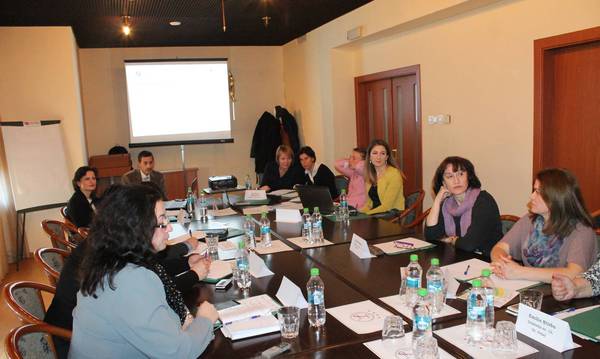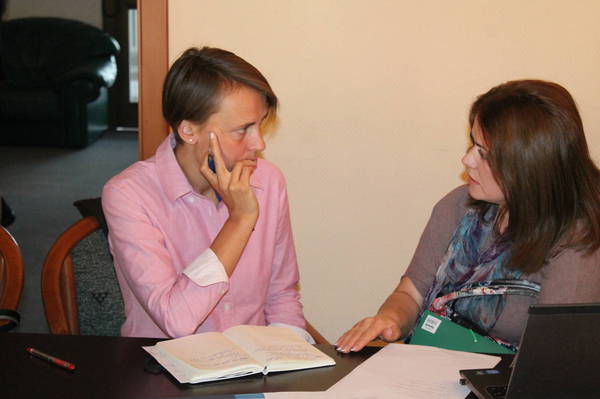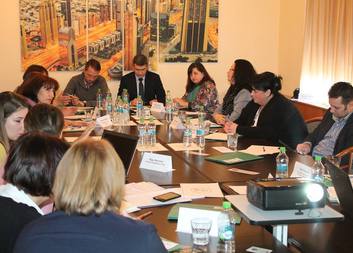On November 19th, 2015, an initiation meeting for the implementation of inclusion in pre-primary education called“Partnership for inclusion“ took place in Chisinau. The meeting was attended by its direct partners, representatives of the organisation Woman and Child – Protection and Support and the representatives of the Republic’s centre of psycho-pedagogic support, ADRA and other organisations working in this area. The initiation was presented by Sergei Lysenko, a specialist on informal education, and it was also attended by honourable guests from the Czech Embassy in Chisinau. Each guest had chance to comment on the plans.
 Victoria Secu, director of the organisation Woman and Child – Protection and Support introduced the individual activities, their purpose, goals and the expected outcome. She also described the common plans: “In twenty months we want to improve the approach for the inclusion in education of children with special needs who are pre-school age and we also want to reduce discriminatory attitudes towards them.”The plan also involves the enhancement of inter-field partnership in inclusive education and specialised training of about 1,000 teachers, pre-primary teachers from 35 centres of pedagogical assistance services, 35 specialists from the department of education and more than 400 representatives of local authorities. The activities with a budget of 135,000 EUR will last until June 2017 and will focus on 300 Moldavian kindergartens including those in Chisinau, Balti and Comratu and at least 100 children will participate.
Victoria Secu, director of the organisation Woman and Child – Protection and Support introduced the individual activities, their purpose, goals and the expected outcome. She also described the common plans: “In twenty months we want to improve the approach for the inclusion in education of children with special needs who are pre-school age and we also want to reduce discriminatory attitudes towards them.”The plan also involves the enhancement of inter-field partnership in inclusive education and specialised training of about 1,000 teachers, pre-primary teachers from 35 centres of pedagogical assistance services, 35 specialists from the department of education and more than 400 representatives of local authorities. The activities with a budget of 135,000 EUR will last until June 2017 and will focus on 300 Moldavian kindergartens including those in Chisinau, Balti and Comratu and at least 100 children will participate.
Emilia Ştirbu, the manager of the pre-primary school no. 12 in the city of Orhei, commented on the need for inclusive education: “Early access to education is of crucial importance for children, as much as food and healthcare. They are in a stage where they grow fast and form their skills for future integration into society”.
“Only at schools attended also by children with special educational needs, do teachers have the motivation to gain deeper knowledge of the issue and therefore make themselves familiar with the children’s’and their parents’ needs”, Virginia Rusnac, director of the Republic’s centre for psycho‑pedagogic support added.
 Olga Sevciuc, a representative of Caritas CR in Moldova, mentioned long-term experience of Caritas CR with the development of various local programmes on the national level. A Czech specialist on preparation of training and advisory activities will also come to Moldova. “We hope to form close a partnership between our countries”, Olga concluded.
Olga Sevciuc, a representative of Caritas CR in Moldova, mentioned long-term experience of Caritas CR with the development of various local programmes on the national level. A Czech specialist on preparation of training and advisory activities will also come to Moldova. “We hope to form close a partnership between our countries”, Olga concluded.
Besides those mentioned above, the meeting was also attended by: Kateřina Šilhánková (diplomat of development cooperation and business from the Embassy of Czech Republic in Chisinau), Radka Bzonková (evaluator from CCR), Viorica Marț (consultant from the Head Office for Pre-school education of the Ministry of Education), Lilia Pavlenco (research worker from the Institute of Science Education), Igor Andrei (research worker from the Center for Investigations and Consultation SocioPolis), Natalia Zotea (trainer from the National Centre for Early Learning and Parent Education) a Andrei Gîrleanu (representative of the organisation ADRA).
As a part of its activities, Caritas Czech Republic cooperates with the non-profit organisation Woman and Child – Protection and Support. The project was financed by Czech Development Agency and the Ministry of Foreign Affairs of the Czech Republic as a part of the Programme of Foreign Development Cooperation of the Czech Republic.





